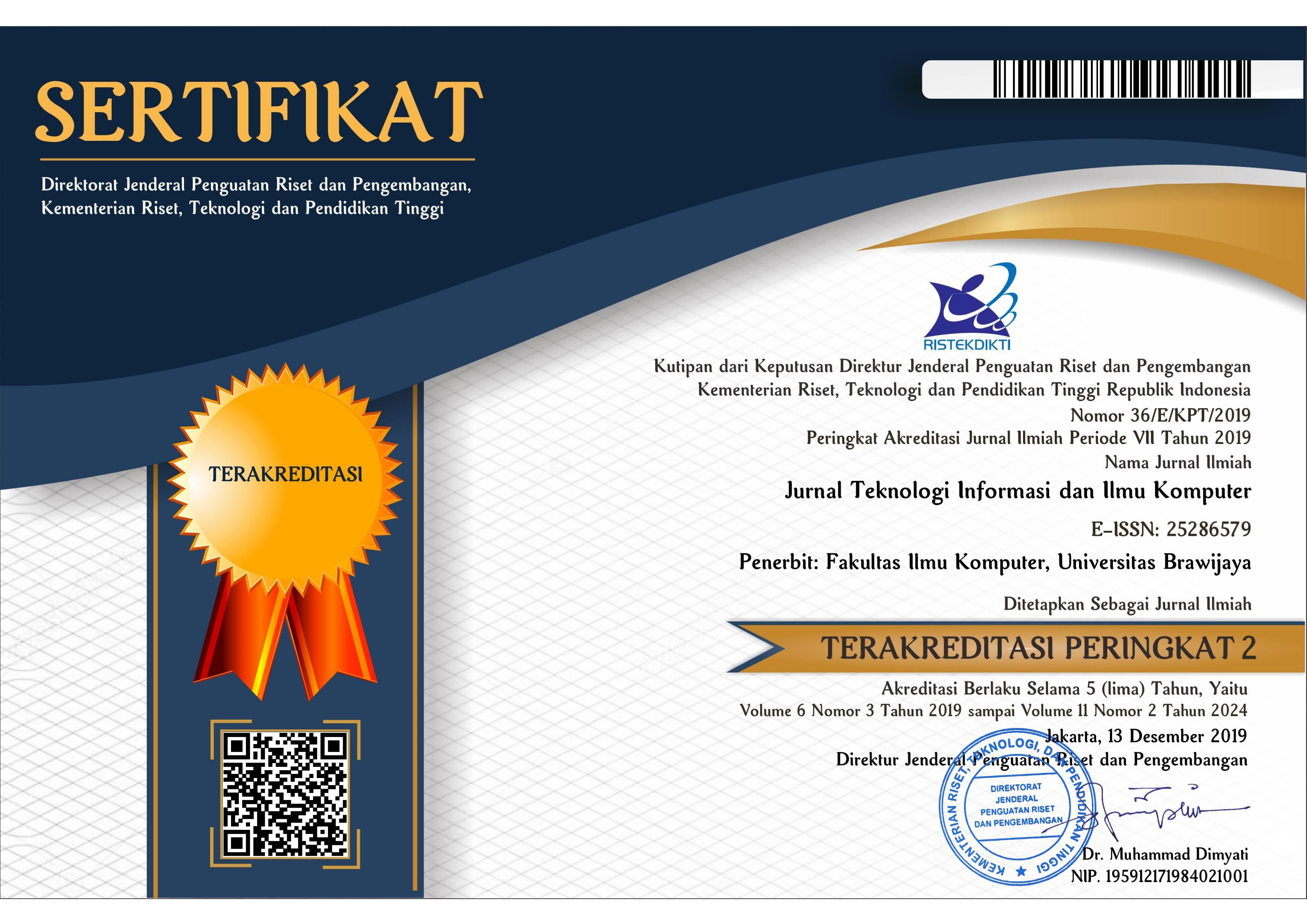Pengaruh Teknik Penanganan Negasi Dalam Analisis Sentimen
DOI:
https://doi.org/10.25126/jtiik.2025129079Kata Kunci:
penanganan negasi, next word negation, antonim sebagai penanganan negasi, analisis sentimen, naïve bayes classifier, support vector machine classifierAbstrak
“Garbage in, garbage out” merupakan sebuah ungkapan klasik dalam data science yang menyatakan bahwa kualitas keluaran suatu sistem bergantung pada kualitas data yang dimasukkan. Dalam klasifikasi sentimen, negasi memainkan peran penting dalam menentukan polaritas sentimen kalimat, tetapi sering kali dihapus pada tahap preprocessing sebagai stopword, yang dapat menghilangkan konteks negasi tersebut. Penelitian ini mengevaluasi dampak dua teknik penanganan negasi Next Word Negation dan penggantian antonim terhadap performa Naïve Bayes Classifier dan Support Vector Machine Classifier. Teknik Next Word Negation menggabungkan kata penanda negasi dengan kata setelahnya seperti “tidak cepat” menjadi “tidak_cepat”. Sementara itu, teknik penggantian antonim mengganti kata penanda negasi dan kata setelahnya dengan antonim dari kata setelahnya, misalnya “tidak cepat” menjadi “lambat”. Hasil penelitian menunjukkan bahwa teknik penanganan negasi meningkatkan akurasi Naïve Bayes dari 82,94% tanpa penanganan negasi menjadi 85,88% dengan Next Word Negation dan 87,64% dengan penggantian antonim. Untuk Support Vector Machine, akurasi meningkat dari 84,70% tanpa penanganan negasi menjadi 89,41% dengan penggantian antonim dan 88,23% dengan Next Word Negation.
Abstract
“Garbage in, garbage out” is a classic expression in data science that states the quality of a system’s output depends on the quality of the input data. In sentiment classification, negation plays a crucial role in determining the sentiment polarity of a sentence but is often removed during the preprocessing stage as a stopword, potentially eliminating the context of negation. This study evaluates the impact of two negation-handling techniques, Next Word Negation and antonym replacement, on the performance of Naïve Bayes Classifier and Support Vector Machine Classifier. The Next Word Negation technique combines the negation marker with the following word, for example, “tidak cepat” becomes “tidak_cepat”. Meanwhile, the antonym replacement technique replaces the negation marker and the following word with the antonym of the following word, for example, “tidak cepat” becomes “lambat”. The results of the study show that negation-handling techniques improve the accuracy of Naïve Bayes from 82.94% without negation handling to 85.88% with Next Word Negation and 87.64% with antonym replacement. For the Support Vector Machine, accuracy increases from 84.70% without negation handling to 89.41% with antonym replacement and 88.23% with Next Word Negation.
Downloads
Referensi
ATTILA, F., & KOVÁCS, G. 2024. Enumerating the k-fold configurations in multi-class classification problems. arXiv.org, abs/2401.13843.
DAS, B., & CHAKRABORTY, S. 2018. An Improved Text Sentiment Classification Model Using TF-IDF and Next Word Negation. ArXiv, abs/1806.06407.
HARIYANTO, H.T., & TRISUNARNO, L. 2020. Analisis Pengaruh Online Customer Review, Online Customer Rating, dan Star Seller terhadap Kepercayaan Pelanggan Hingga Keputusan Pembelian pada Toko Online di Shopee. Jurnal Teknik ITS, 9(2).
GÓRRIZ, J.M., SEGOVIA, F., RAMIREZ, J., ORTÍZ, A., & SUCKLING, J. 2024. Is K-fold cross validation the best model selection method for Machine Learning? ArXiv, abs/2401.16407.
MARCO, A., PALOMINO, F., & AIT AIDER, A. 2022. Evaluating the Effectiveness of Text Pre-Processing in Sentiment Analysis. Applied Sciences, 12(17), 8765-8765.
NAMA, G.F., PUTRI, D.D., & SULISTIONO, W.E. 2022. Analisis Sentimen Kinerja Dewan Perwakilan Rakyat (DPR) Pada Twitter Menggunakan Metode Naive Bayes Classifier. Jurnal Informatika dan Teknik Elektro Terapan (JITET), 10(1), 34-40.
TARECHA, R.I., WAHYUDI, F., & JANNAH, U.M. 2022. Penanganan Negasi dalam Analisa Sentimen Bahasa Indonesia. Jurnal Sistem Informasi Dan Informatika (JUSIFOR), 1(1), 51–58.
WAWORUNDENG, J.M.S., SANDAG, G.A., SAHULATA, R.A., & RELLELY, G.D. 2022. Sentiment Analysis of Online Lectures Tweets using Naïve Bayes Classifier. CogITo Smart Journal, 8(2), 371–384.
Unduhan
Diterbitkan
Terbitan
Bagian
Lisensi
Hak Cipta (c) 2025 Jurnal Teknologi Informasi dan Ilmu Komputer

Artikel ini berlisensiCreative Commons Attribution-ShareAlike 4.0 International License.

Artikel ini berlisensi Creative Common Attribution-ShareAlike 4.0 International (CC BY-SA 4.0)
Penulis yang menerbitkan di jurnal ini menyetujui ketentuan berikut:
- Penulis menyimpan hak cipta dan memberikan jurnal hak penerbitan pertama naskah secara simultan dengan lisensi di bawah Creative Common Attribution-ShareAlike 4.0 International (CC BY-SA 4.0) yang mengizinkan orang lain untuk berbagi pekerjaan dengan sebuah pernyataan kepenulisan pekerjaan dan penerbitan awal di jurnal ini.
- Penulis bisa memasukkan ke dalam penyusunan kontraktual tambahan terpisah untuk distribusi non ekslusif versi kaya terbitan jurnal (contoh: mempostingnya ke repositori institusional atau menerbitkannya dalam sebuah buku), dengan pengakuan penerbitan awalnya di jurnal ini.
- Penulis diizinkan dan didorong untuk mem-posting karya mereka online (contoh: di repositori institusional atau di website mereka) sebelum dan selama proses penyerahan, karena dapat mengarahkan ke pertukaran produktif, seperti halnya sitiran yang lebih awal dan lebih hebat dari karya yang diterbitkan. (Lihat Efek Akses Terbuka).















